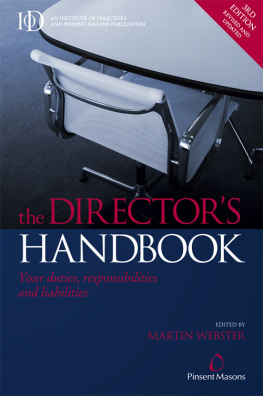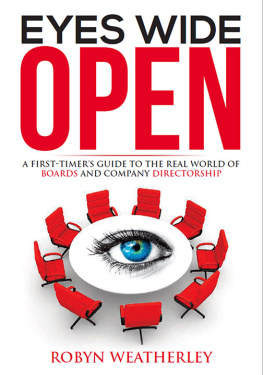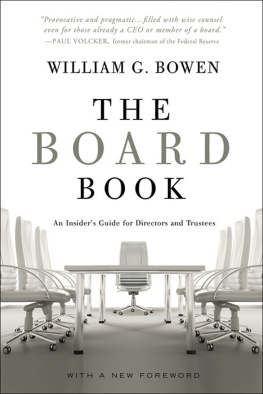This booklet is designed for the new director. It gives a basic outline of the duties and responsibilities of a board director and includes some extra information to help the new director to find their way in a board and settle in it comfortably.
The board of directors function is primarily that of corporate governance. Corporate Governance is the method by which a corporation or organisation is governed or controlled. How it is run and administered and what policies and guidelines it operates from.
The type of governance a corporation has will depend on a number of factors. Size is one, both of the board and of the company. Ownership structure, even the power structure; who controls what. Also, the type of industry and community framework will have a bearing on the corporate structure and governance used by a company.
It is recommended that you study this book thoroughly and make it absolutely certain that you never go past a word, which you do not fully understand. The only reason a person gives up a study or becomes confused or is unable to learn is because he or she has gone past a word or phrase that was not understood. An attempt to read past a misunderstood word results in mental fogginess and difficulty in comprehending the passages, which follows. If you find yourself experiencing this, return to the last portion you understood easily, locate the misunderstood word and get it defined correctly and then continue with the rest.
Intro to Corporate Governance
Corporate governance has been defined by the ASX Corporate Governance council as:
The framework of rules, relationships, systems and processes within and by which authority is exercised and controlled in corporations.
It also includes those methods by which companies and those directing and controlling the company, are held responsible for the company and can be therefore held accountable.
Companies come in all shapes, sizes and structures. The governance that applies will vary according to the type of company it is. A small two-director company with less than 10 employees and under one million dollars turn over will operate very differently to that of a large corporation of thousands of employees, a full board of 7 or ten directors with various committees and subcommittee and a turnover of billions of dollars.
In addition, public companies, unlike private, needed to conform to the Listed Rules for the Exchange, for ASX listed companies.
But the basics of corporate governance remain regardless of the size and type of company.
The directors must carry out, or ensure that the legal requirements of corporation are carried out and ensure that the corporation or company complies with statutory and common law, as applied to businesses.
A New Director
A new director needs to become fully familiar with the fundamentals of the business and operations of the company. This includes making sure that one is fully informed about the company and its business. This can be done by making initial enquiries and doing some due diligence and research to ensure that this is a company which one wishes to participate in.
Becoming familiar with the financial operation and status of the company; including having the ability to read and understand financial statements and have a basic knowledge of accounting practice and material accounting standards, so that one has a thorough understanding of the companys financial capacity and solvency.
It means being able to understand financial reports and glean from them the existing and future condition of the company. It also means being responsible to ensure that accurate reports are presented under the Corporations Act, to satisfy legislative requirements and to query any inconsistencies or potential issues.
All directors are expected to attend board meetings, unless, exceptional circumstances such as illness prevents their attendance. Further, a director must be alert and pay attention to the matters being discussed at board meetings and should be aware that they cannot be excused from liability on the basis that he or she did not pay attention to the proceedings.
It is possible for a director to delegate responsibilities usually performed by the director. However, the director is still responsible for the supervision of the delegate and their activities whilst performing such duties and responsibilities. These do not include signing off the final approval of accounts which must be done by the directors themselves.
The Corporations Act requires a director to act in good faith and in the best interests of the company and for a proper purpose. The interests of the company, in this wise, take precedence over individual interests. Duty is owned to the company, not to any particular individual. This includes encompassing the interests of the shareholders, to which the director has a responsibility, as it is their money the director is being responsible for.
In situations where there is one shareholder, which is the parent company, the director should keep in mind the interest of that parent company. The Corporations Act shows that a director is taken to act in good faith in the best interests of a wholly owned subsidiary if the subsidiarys constitution authorises the director to act in the best interests of the holding company, the director does so in good faith and the subsidiary is not insolvent.
The interests of creditors should also be taken into account, particularly if the company is insolvent or approaching insolvency.
A proper purpose is where the purpose is to the benefit of the company. An example of an improper purpose is where the purpose would be to the benefit of the director or someone else, such as using knowledge of a companys new direction which, when publicly exposed, would affect the share price, for ones own benefit. In another example, directors issuing new shares for a collateral purpose, such as delivering control of the company to a particular person, ensuring that the directors remain on the board or obtaining some financial benefit for a director.









